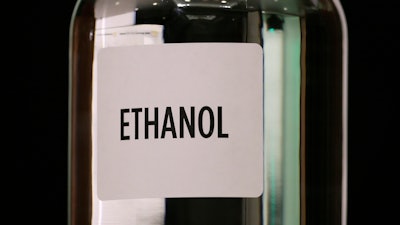
DES MOINES, Iowa (AP) — The Food and Drug Administration has relaxed regulations on the types of alcohol that can be used to make hand sanitizers during the shortage caused by the coronavirus pandemic, expanding the market to potentially millions of gallons made by ethanol producers.
Hospitals and nursing homes are desperately searching for hand sanitizer, and ethanol plants that can make large batches of its main ingredient, alcohol, have offered to help.
The FDA has stringent production standards designed to protect the quality of medicines, food ingredients and dietary supplements, and it prohibited many ethanol plants from using their alcohol which didn't meet high quality specifications for use in drugs or beverages.
Under the latest FDA guidelines announced Friday, ethanol made at plants that produce fuel ethanol can be used if it contains no additional additives or chemicals from the plants and they can ensure water purity and proper sanitation of equipment. The FDA said it will consider each plant on an individual basis and grant approval only if a plant meets quality control specifications.
“To FDA’s credit they did take to heart some of the concerns that were being raised by the industry and made some slight changes and modest tweaks to their guidance and I think that’s really helped open the door for our producers,” said Geoff Cooper, CEO of the Renewable Fuels Association, a national ethanol producer trade group.
He said 15 to 20 ethanol plants have already responded to the new FDA rules and are making alcohol for hand sanitizer and more are expected to join.
“They just want to do their part to help fight the virus,” Cooper said.
Green Plains Inc. which owns 13 ethanol plants nationwide, has provided alcohol from its York, Nebraska plant, said CEO Todd Becker.
“We’re shipping that now to customers in the United States for use in hand sanitizer including donations we’ve made to the state of Nebraska and they’ve already made hand sanitizer out of it for the department of corrections and other state agencies,” he said.
The FDA refused the industry's request to allow alcohol to be used without a bitter additive that makes it undrinkable. The FDA insists this step is “critical” because of cases of poisoning, sometimes fatal, among young children who have accidentally ingested hand sanitizers.






















